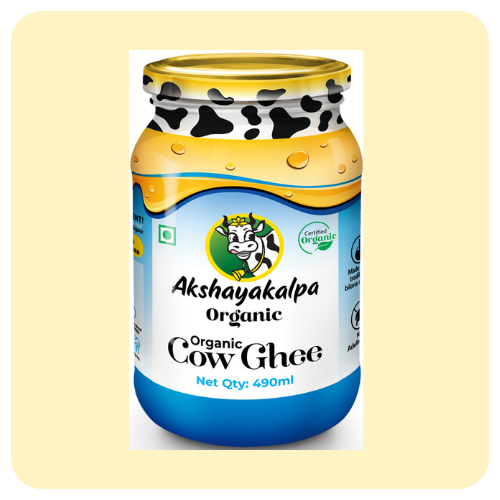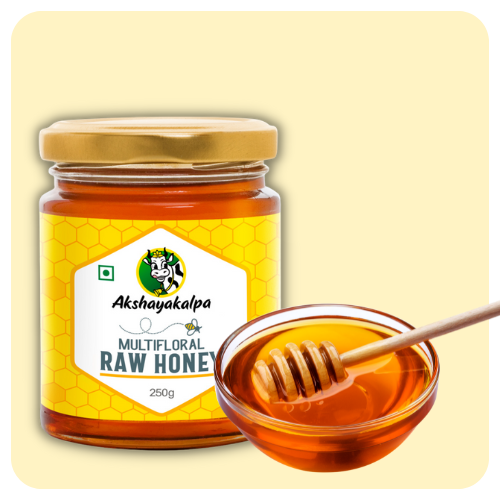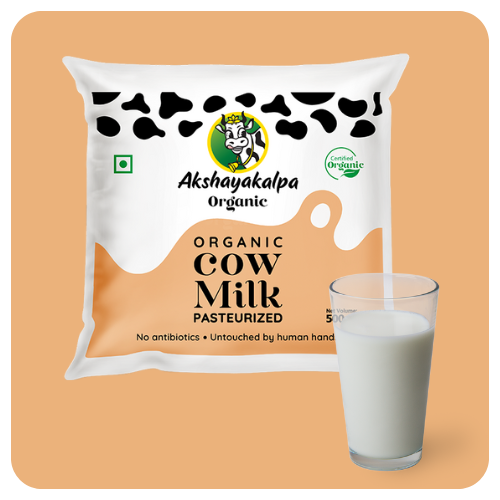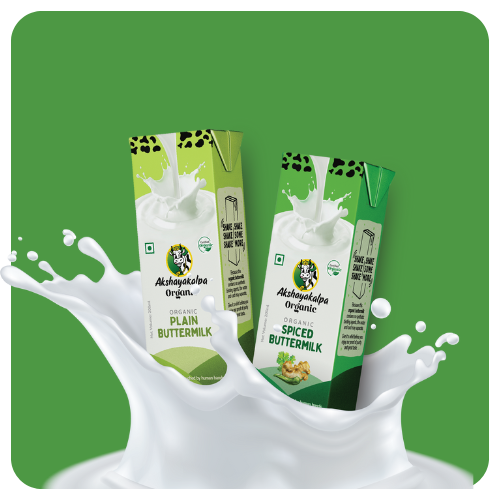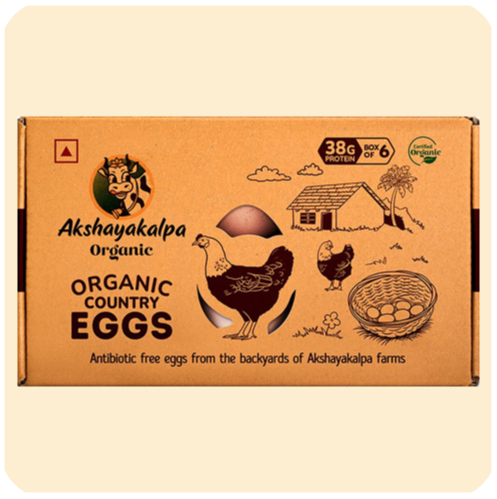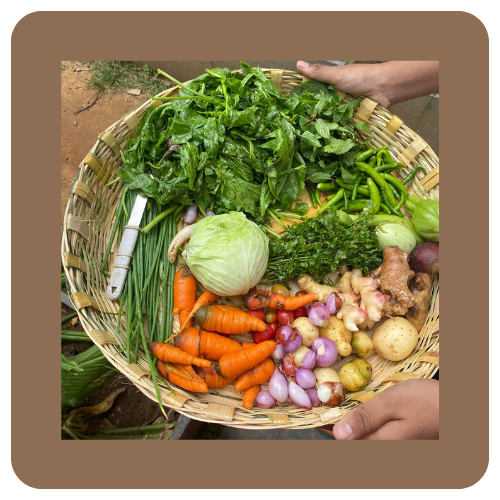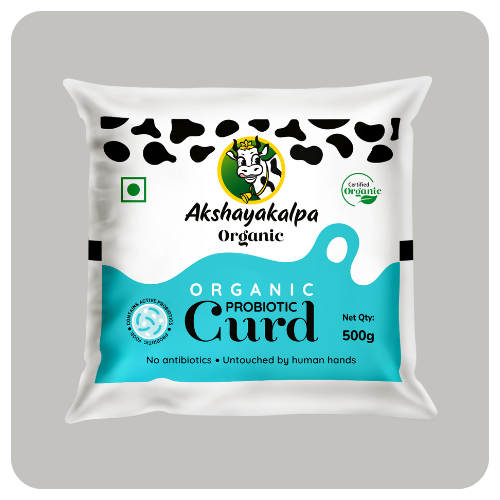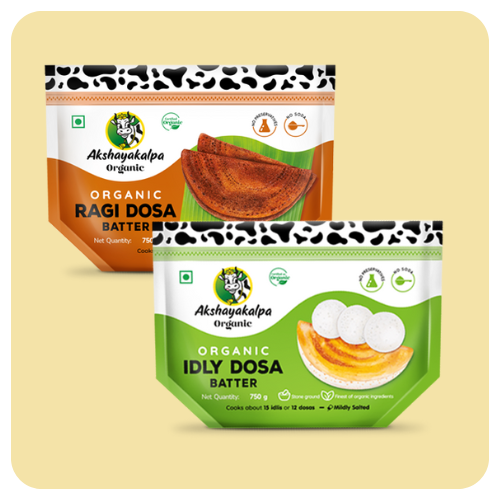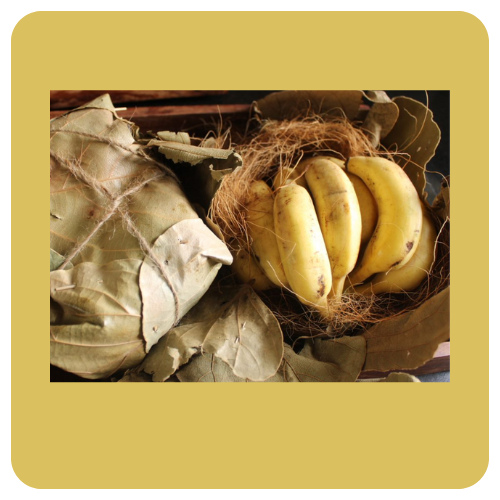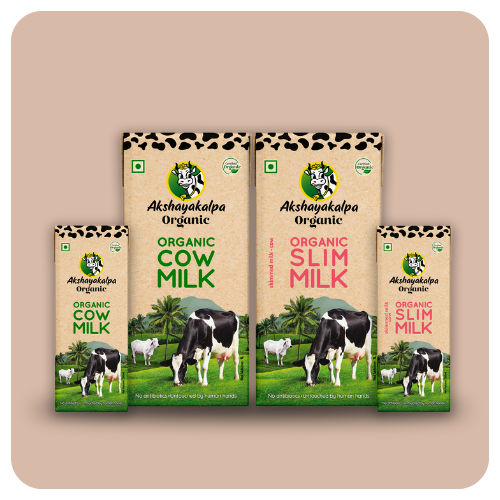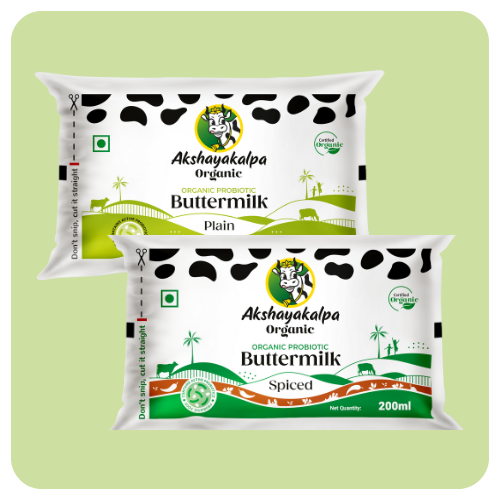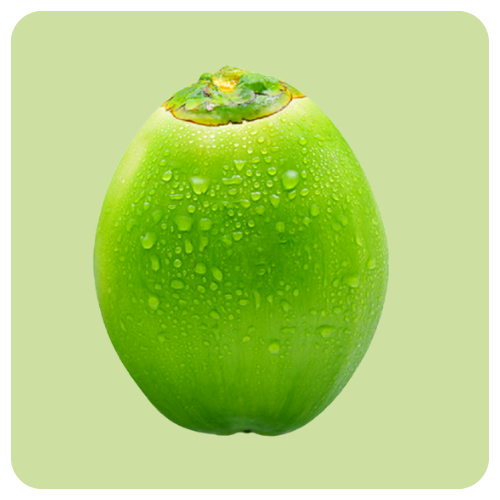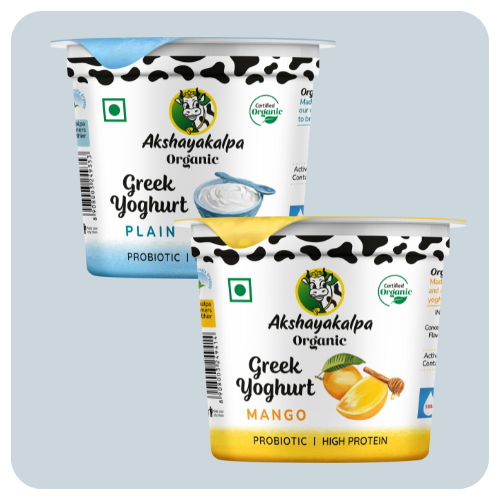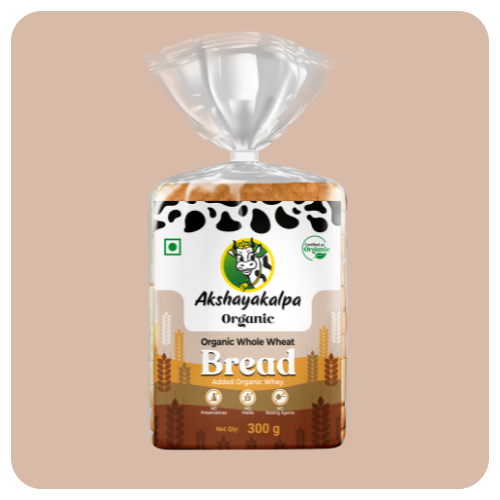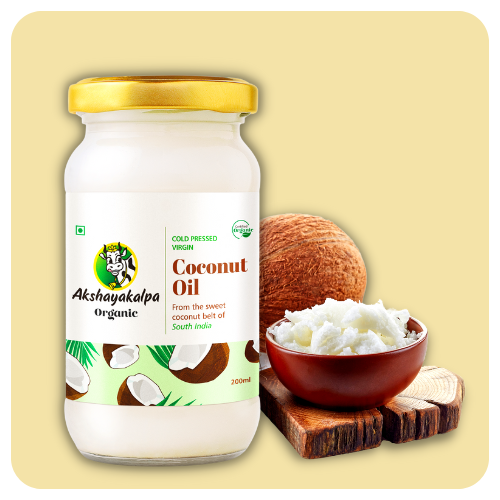Frequently Asked Questions
How was Akshayakalpa founded?
Genesis of Akshayakalpa dates to years 2001-2009, where the Youva Chethna program encouraged like-minded people from urban areas to contribute to train young people and women in need in rural regions to take up agriculture/farming as a vocation of choice. The idea of young people being trained to take up agriculture/farming as a vocation of choice was transformed into idea of rural entrepreneurship model under Akshayakalpa in the year 2010, when our Co-founder and CEO Mr. Shashi Kumar and his friends seed funded Akshayakalpa in November the same year.
What is unique about Akshayakalpa Organic Milk?
We combine the best of technology and traditional practices to make sure that the best quality milk reaches you. Akshayakalpa Organic Milk is chilled at farm level immediately after milking to maintain the nutrition intact and is free from antibiotics and induced growth hormones. It comes from stress-free cows. Our cows are fed only with organic fodder; they are not tied and have access to feed, fodder, and water all the time.
What is Organic?
Our ecosystem comprises three elements: Human beings, soil, and resources. Nature intends all of them to coexist in a symbiotic/interdependent relationship, where each enriches the other. This coexistence to us, is organic.
What is Organic Milk?
There should be a symbiotic/interdependent relationship between human beings, soil and natural resources. Milk can be called organic when it comes from cows raised in conditions that are accommodative of their natural behaviour and the symbiotic relationship is not broken. Cows are fed feed and fodder that is free from synthetic fertilizers and pesticides and are not treated with antibiotics or induced hormones. Cows are not tied and have access to feed, fodder and clean drinking water all the time.
Are Akshayakalpa Milk and Milk Products certified Organic?
Across the globe, there are multiple organizations that regulate the production of Organic food, in India it is done by Agricultural and Processed Food Product Export Development Authority (APEDA). Akshayakalpa Organic Milk and Milk products are certified organic as per the guidelines of APEDA. We also have the Jaivik Bharat certification.
How do you manage to deliver milk so fresh?
The Akshayakalpa Organic milk journey of freshness starts at the farm level. Milk is chilled immediately after milking to 4 Deg C at the farm level to stop any bacterial growth. After chilling at the farm level, milk is moved to the processing plant in tankers designed to ensure milk stays fresh throughout. Once the milk reaches our processing plant, milk is packed in pouches or glass bottles or milk paper board packing and takes a final journey to your doorstep in continuous cold chain vehicles. This entire process takes about 24 to 36 hours to reach you and hence stays fresh. Akshayakalpa Organic Milk journey of freshness is a stark contrast to prevailing practices in the country where it takes anything between 72 hours to 96 hours after milking to reach your doorstep.
Why do you work with the farmers so closely?
In the regular agricultural scenario, farming is seen as a financially unviable vocation, leading to people taking it rather less seriously. The farmers are unable to get prices that are not viable for them, which pushes them to employ artificial measures to improve yield. Owing to this, the consumer ends up with poor quality food. This is the problem that Akshayakalpa seeks to solve. We want to ensure that the farmer can get the right prices by changing just some production practices, and our Patrons get the products that are of the best quality.
How do you take care of quality at farm level?
At Akshayakalpa, we ensure that we have complete control over activities in the farm. The milking process at our farms is completely automated, leaving no scoped for the milk being touched by human hands. The milking is done using machines that imitate the sucking of a calf; the milk then goes to Bulk Milk Coolers where it is chilled at 4-degree C. We also carry out testing at farm level to detect any trace of antibiotics in the milk. The test results are then uploaded to the cloud so that we can closely monitor them on a regular basis.
Where are your farms located?
It is important to us that our farms be close enough to our patrons but away from the pollution of our cities. That is why our farms are located in Tiptur near Bengaluru, Shadnagar near Hyderabad and Pooriyambakkam near Chennai.
I would like to see where my glass of milk comes from.
Akshayakalpa actively encourages consumers to visit Akshayakalpa farms and spend time with farming families so that they can appreciate and know where their glass of milk comes from. Also, in the process they can understand the value of their food and in future can go back torootsand grow their own food. Our farms are in Tiptur near Bengaluru and coming up in Chengalpattu near Chennai. To visit our farms, you can reach our Customer Support at +91-9535388122 or write to us support@akshayakalpa.org. We will facilitate your stay at our farms.
Why are Akshayakalpa Organic Milk and Milk products expensive as compared to others in the market?
Setting up an Akshayakalpa farm is a costly process, it takes substantial investment from the farmer. A farmer will produce good quality milk only if it is economically viable for him orher.Hence, a farmer needs to be compensated in a different manner when compared to regular practice. This milk reaching you is an expensive process. It requires a continuous cold chain, and substantial manpower involvement at various stages. Currently, the number of people who understand and appreciate this milk is low. When consumers start appreciating this milk at a scale, the cost per consumer will come down. So, when you buy any Akshayakalpa product, just be assured you are paying for the best quality and strengthening farmers economically.
What do you mean when you say your farms are self-sustaining?
Our farms are an embodiment of how nature carries out its processes. All the elements in nature exist in a symbiotic relationship, where each enriches the other. We at Akshayakalpa farms practice closed loop soil management system. Our farms do not require external elements to sustain. The fodder for the cows is grown in the farms by Akshayakalpa farmers. The cow dung is used to produce methane gas which is then used to generate electricity for day to day activities at the farm. The slurry from the bio-gas plant goes back to the soil as a manure, and the cycle continues.
Is the milk truly untouched by human hands?
Yes. At every step of the supply chain we make sure that the milk is untouched by human hands. Starting at the farms, the cows are milked using machines that imitate the sucking of a calf. After milking, the milk goes to Bulk Milk Coolers through attached pipelines. The milking machines and the BMCs are run on electricity generated from Methane gas that comes from Cow dung. After chilling, the milk is moved to the plant in tankers designed to maintain the freshness of the milk. At the plant, the packaging process is automated, which leaves no scope for milk being touched by human hands.
How do you take care of the health of the cows?
Our cows can roam freely in a dedicated paddock area, they are not tied. They have unlimited access to organic fodder and clean drinking water; they decide what and how much they want to consume. The calves are fed with colostrum milk. We have vets trained in ethnoveterinary practices who do regular check-ups and ensure that are cows are healthy and happy.
What do you mean when you say your cows are healthy and happy?
A living being is happy when it lives in conditions that allows them to be the way nature intends them to be; Cows express their happiness by jumping and playing around. Our cows are never tied. They have a dedicated paddock area where they roam freely. They always have access to fodder and potable water. We believe that if the water is not fit for our own consumption, it is not fit for our cows to consume. Our cows choose what and how much they want to eat.
Why is it necessary for cows to roam freely?
Cows are known to be very sensitive beings. They can experience an array of emotions based on how they are treated. When they are stressed, they release stress hormones into the milk. This can affect the quality of the milk. Therefore, it is necessary that cows are kept in conditions that are accommodative of their natural behaviour.
What happens when the cows are unwell?
Our cows get a regular check-up from expert vets trained in ethnoveterinary practices. When the cows are unwell, the vets try to treat them with normal medicines as much as is possible. However, if it becomes necessary to treat the cow with antibiotics, the cow is quarantined till there is absolutely no trace of antibiotic in the milk.
What breeds of cows do you have on your farms?
We have cross breeds as wells indigenous breeds. All of them are born locally, and the local weather conditions are well suited to them. The weather in which a cow lives has significant effect on the cow health. A cow might not be in the best of its health if the weather is not suitable, which may also affect the quality of the milk.
What fodder do Akshayakalpa Cows eat?
A mix of organic fodder; monocots (maize, ragi and local jowar) and dicots (cow pea and velvet beans) along with tree fodder (moringa), all of which are grown organically by the farmers themselves, are fed to the cows. Our cows are also fed Azolla which is rich in proteins, essential amino acids, vitamins and minerals.
I would like to see where my glass of milk comes from.
Akshayakalpa actively encourages consumers to visit Akshayakalpa farms and spend time with farming families so that they can appreciate and know where their glass of milk comes from. Also, in the process they can understand the value of their food and in future can go back to roots and grow their own food. Our farms are in Tiptur near Bengaluru and coming up in Chengalpattu near Chennai. To visit our farms, you can reach our Customer Support at +91-9535388122 or write to us support@akshayakalpa.org. We will facilitate your stay at our farms.
What differentiates Akshayakalpa Organic Milk from the other Milk available in Market?
At Akshayakalpa, the journey of good quality begins at the very first level of the supply chain, we have a complete control over the activities at farm level. Akshayakalpa Organic Milk is free from antibiotics and induced growth hormones; It comes from stress-free cows. Our cows are never tied or force-fed. They are allowed to roam freely in a dedicated paddock area and have a free access to organic fodder and clean drinking water. Use of antibiotics and growth hormones is strictly restricted on the farms. The milking is done using machines that imitate the sucking of a calf, so that there is no scope of contamination from hands. Akshayakalpa is the only dairy organization in India that has farm level testing and chilling. Immediately after milking the milk is chilled at 4 degree C in the BMCs, to curb the bacterial growth. Then the milk is tested to make sure there are no antibiotic traces, the test results are then uploaded to the cloud for regular monitoring.
What is antibiotic free milk?
At Akshayakalpa, unadministered use of antibiotics is strictly prohibited. Milk is tested at farm as well as the plant to make sure there is no antibiotic trace in the milk. If tests are found to be positive, the milk is not accepted at the plant. In case it is necessary to treat a cow with antibiotics, it is done only under the administration of vets trained in ethnoveterinary practices. The cow is then quarantined, and the milk is not accepted at the plant till it has absolutely no trace of antibiotics. According to WHO, antibiotic resistance is one of the biggest threats to global health today. It can happen to anyone irrespective of their age. Unadministered antibiotic usage in humans and animals increases the risk of Antibiotic resistance. Antibiotic resistance makes medicine used to treat diseases less effective, making it harder to treat the diseases.
How is Akshayakalpa enabling farmers to produce milk without Antibiotics?
In conventional dairy production systems, there is no control on farm level production processes. Akshayakalpa controls every activity at farm to produce good quality milk. Our cows receive a regular check-up from our veterinarians. (insert from farms and cows) No medication given to the cows is unadministered. Only the medication prescribed by the vet can be given to a cow.
What are the induced hormones you talk about and why are they dangerous?
It is a widespread practice in conventional dairying practices to treat cows with hormones to enhance the yield of the milk. Growth hormones are known to increase the risk of udder infection- mastitis in cows. They can also cause loss of appetite, nausea, sinus irritations, or loss of memory in humans. In Akhshayakalpa farms, the usage of induced growth hormones is strictly prohibited.
What types of milk do you have?
We have 3 variants of Organic Cow Milk: Whole milk, Slim milk, and Lactose-free milk. Whole milk is the milk that we deliver as it comes from the cows, the natural composition of the milk is not altered. If you are calorie conscious or simply do not like the layer of cream in your milk, you can try Akshayakalpa Organic Slim Milk. If you are sensitive to lactose, you can still enjoy the benefits of Organic Cow Milk by consuming Akshayakalpa Organic Lactose-free milk.
Will I be charged any additional fee for using online payment option?
No. We do not charge any additional fee.
How do I store Akshayakalpa Organic Milk?
Please pick up the packet of milk from your doorsteps as soon as it is delivered, wash it with potable water, refrigerate it immediately or boil it, cool it and store it in refrigeration.
What is A2 whole milk?
A cow’s milk contains roughly 87% water, 3.4-4.5% fat, and 8.5-9% proteins and carbohydrates. The SNF comprises Lactose (Carbohydrate), Protein, and Vitamins and Minerals. The protein mainly comprises of Beta Casein. A1 and A2 both are types of Beta Casein. Milk comprises A1 as A2 Beta Casein, the milk that has more that 80% A2 Beta Casein is termed as A2 milk.
Is A2 milk more nutritious that A1 milk?
There are multiplies studies that have been carried out on this topic. However, there is no conclusive scientific evidence that proves that A2 milk is more nutritious.
How do you enable farm level chilling?
Our vision is to create value for our farmers by creating value for our Patrons. Therefore, to ensure that we deliver the best quality milk, we put great effort into building each farm of ours. We ensure that all our farms are equipped with the infrastructure that enables them to deliver the quality that meets our standards. Akshayakalpa is the first dairy company that has Bulk Milk Coolers at each farm. Immediately after milking, milk is chilled to keep the nutritional value of the milk intact.
How does the life of raw milk affect the nutritional value?
When the cow is properly taken care of, the milk in cow’s udder is sterile. Soon after the milking when it is exposed to the external environment, the bacterial activity starts. The bacterial growth multiplies at a constant rate every hour. It is important to have a proper farm level handling and chilling process in place so that the life of milk doesn’t get shortened. Akshayakalpa ensures all these protocols are followed.
I am facing curdling issue. What should I do?
Akshayakalpa Organic Milk is free from stabilizers. We do not process the milk; we deliver it the way it comes from the cows. Therefore, if it is left out of cold chain for a longer time, it may curdle. Curdling is not a sign of poor quality, rather of purity. Please pick up your packet of milk as soon as it is delivered, wash it with potable water, and refrigerate it. In case if it curdles, try to make Paneer from it.
Why does Akshayakalpa Organic Milk sometimes appear thin?
Akshayakalpa Organic Milk is pure cow milk. We deliver milk to you the way it comes from cows, without processing it. Our cows are not force-fed, they choose what they want to eat and how much they want to eat. The milk is non-homogenized and non-standardized. We do not add any artificial additives to the milk. That is why it may appear thin sometimes.
Is Akshayakalpa Organic Milk processed?
No. Except for Akshayakalpa Organic Slim Milk in which the fat is removed, no other Akshayakalpa Organic Milk is processed.
Why does the thickness of the milk vary if it is not processed?
As opposed to common perception, unprocessed milk cannot have a uniform thickness and cream content. Natural processes don’t give constant outcomes. Naturally fed cows give milk differently in summer and in winter. On a hot summer day, a cow consumes lesser food and drinks a lot of water. This leads to the lower fat content in milk. On a hot summer day, we too drink more water and tend to eat less. We believe it is beneficial for us to be the way nature intends us to be.
Why is the milk yellowish in colour?
Akshayakalpa Organic Cow Milk is rich in Beta Carotene which gives a yellowish tinge to the milk.
What is the source of Beta Carotene in the milk?
Beta Carotene is found in good amounts in green fodders. When cows eat green fodder, the Beta Carotene gets soluble in milk fat. All the fodder that our cows eat, is grown using Organic methods on Akshayakalpa farms. Growing organic fodder helps us ensure that the cows are eating only right quality of food.
Akshayakalpa Organic Milk seems to be more expensive than the other brands in the market. Why?
Setting up an Akshayakalpa farm is a costly process, it takes substantial investment from the farmer. A farmer will produce good quality milk only if it is economically viable for him or her. Hence, a farmer needs to be compensated in a different manner when compared to regular practice. This milk reaching you is an expensive process. It requires a continuous cold chain, and substantial manpower involvement at various stages. Currently, the number of people who understand and appreciate this milk is low. When consumers start appreciating this milk at a scale, the cost per consumer will come down. So, when you buy any Akshayakalpa product, just be assured you are paying for the best quality and strengthening farmers economically.
What types of curds are available at Akshayakalpa?
We have 3 variants in Curds- Organic Curd, Organic Set Curd, Organic Amrutha A2 curd. All our curds are made from wholesome Organic Cow Milk.
What is the difference between Akshayakalpa Organic Set Curd and Akshayakalpa Organic Curd?
Akshayakalpa Organic Set Curd as well as Akshayakalpa Organic Curd are made from wholesome Organic Cow milk. Akshayakalpa Organic Curd is made from pasteurized milk using culture to curdle the milk. Akshayakalpa Organic Set Curd is made from pasteurized milk and special active probiotic enzymes meant to achieve the thick, creamy texture. There is not a major difference in nutritional value of both the curds.
Can I use Akshayakalpa Organic Curds to make curd?
We do not advise using our curd as a culture. Akshayakalpa Organic Curds are made using cultures that do not get activated at room temperature. That is why one might encounter problem while trying to set curd using. Akshayakalpa Organic Curds as a culture. We use this type of culture so that we can maintain the taste and quality of the curds naturally without using any type of artificial stabilizers or preservatives.
What is the life of Akshayakalpa Organic Curds?
Akshayakalpa Organic Curds are made using cultures that do not get activated easily in room temperature so that the quality of curd can be maintained for a longer time without the use of stabilizers or preservatives. The life of Akshayakalpa Organic Set curd is 7 days from the date of manufacturing. The life of Akshayakalpa Organic Curd and Akshayakalpa Organic Amrutha A2 Curd is 6 days from the date of manufacturing. Once opened, use within 2 days.
Why does the Curd taste sour?
Curd is a source of live and probiotic good bacteria. The taste of the curd constantly keeps developing due to the bacterial activity. We do not add any stabilizer or preservative to stop the bacterial activity. That is why sometimes when kept out of fridge/cold chain, the curd may taste sour due to bacterial activity. However, this does not pose any harm to your health. It is safe to consume the curd up to the recommended use by date.
What do I do if the packet of curd has bloated?
Generally bloating happens when the curd is out of cold chain or refrigeration for a long duration. If the packet of the curd is bloated, do not consume it. If it is bloated on delivery, please contact our customer care and mention the batch number, manufacturing and use by date. If it has bloated some days after it being delivered, please dispose it.
What differentiates Akshayakalpa Organic Malai Paneer from others available in the market?
Akshayakalpa Organic Malai Paneer is made from wholesome Akshayakalpa Organic Cow Milk. In conventional Paneer production practices, Paneer is made from the milk that is about to get spoilt or is already spoilt. While this may not be very visible in the texture or colour of the Paneer, it has a significant effect on the nutritional value of the product. At Akshayakalpa, we use only fresh Organic Cow milk and Organic Curd.
Why is Akshayakalpa Organic Malai Paneer hard?
We recommend that Akshayakalpa Organic Malai Paneer is soaked in potable water at room temperature for 30-45 minutes prior to usage, you’ll notice that the paneer has become soft. Akshayakalpa Organic Malai Paneer has 50% milk solids and 50% moisture. Also, we do not add artificial emulsifiers and preservatives to the Paneer. To maintain the quality of the paneer, it is kept in a continuous cold chain. That is why it may seem hard.
Why is Akshayakalpa Organic Paneer more expensive than other Paneers available in market?
At Akshayakalpa, Paneer is made only from fresh, wholesome Organic Cow Milk and Organic Curd. To make 1 kg of Paneer, we need approximately 8 litres of milk. In conventional paneer production practices, Paneer that is made from milk that is about to get spoilt or is spoilt. Also, these Paneers full of artificial emulsifiers, and preservatives. They have little nutritional value. Akshayakalpa Organic Milk has 50% moisture and 50% milk solids. Maintaining this quality is costly.
How do I store Akhshayakalpa Organic Malai Paneer?
It advisable to store the Paneer in refrigerator at 4-degree C, do not freeze. Once it has been opened, please use within 1 day.
What is the life of Akshayakalpa Organic Malai Paneer?
The life of the Paneer is 30 days from the date of manufacturing. However, once opened, it is advisable to use it within one day.
How to use Akshayakalpa Organic Malai Paneer?
Keep it in continuous refrigeration at 4-degree C. We recommend that Akshayakalpa Organic Malai Paneer is soaked in potable water at room temperature for 30-45 minutes prior to usage, you’ll notice that the paneer has become soft.
What differentiates Akshayakalpa Organic Artisan Cheeses from rest of the Cheeses available in the market?
Akshayakalpa Organic Artisan cheese is made from wholesome organic cow milk using traditional methods. We do not add artificial emulsifiers or preservatives to the cheeses; the only preservative it contains is Organic Himalayan Pink Salt. It takes around 3 months to make Akshayakalpa Cheeses. The cheese is first made using microbial rennet under certain conditions, no animal rennet is used. Then the freshly made cheese is pressed into blocks using weights. These blocks are then aged in ripening rooms with a temperature of 15 degree C and 80% humidity. The blocks are turned and checked every day to ensure there are no molds growing on the cheeses. While other cheeses in the market are highly processed using industrial methods, Akshayakalpa prefers to do it in an Artisanal method.
Why Artisan Cheeses?
Cheese is milk’s journey to immortality. 1 gram of cheese has as much nutrition as 10 grams of milk. The best cheeses in the world are handcrafted using traditional methods. These cheeses are aged in ripening rooms. Aged cheeses loose moisture and become harder. Aged cheeses made using traditional methods, have a longer life naturally. They do not have emulsifiers or preservatives. Aged cheeses can stay in a good quality for months together.
What is the life of Akshayakalpa Organic Artisan Cheeses?
Akshayakalpa cheeses are made using traditional methods which helps naturally enhance the life of the cheeses. After the cheese is made, it is pressed using weights for up to 12 hours. After that it is kept on stone slabs in ripening rooms for up to 90 days, and each block is turned and checked every day to ensure that there is growth of molds. Our artisans lightly dab the blocks with Olive Oil to avoid growth of molds on cheeses. Akshayakalpa Organic Pizza Cheese has a life to 30 days from manufacturing. All Akshayakalpa Organic CheddarCheeseshave a life of 90 days from manufacturing.
There are molds on my cheese. What do I do?
Akshayakalpa Organic Artisan Cheeses are made using microbial rennet. Molds on the cheeses appear when the bacteria in the cheese react with the atmosphere. However, this is not something to worry about. In fact, in many countries it is very popular to consume molded cheeses, artisansdeliberately let the molds grow to enhance the flavour of the cheeses. It is perfectly okay to scrape off the molds and consume Akshayakalpa Organic Cheeses up to their recommended use by date.
How do I store Akshayakalpa Organic Artisan Cheese?
It is advisable to store our cheeses at 4 deg C. Once it has been opened, please keep the Cheeses in an airtight container. Do not deep-freeze.
How do I store Akshayakalpa Organic Cow Ghee?
Akshayakalpa Organic Cow Ghee is free from any kind of preservatives and is made using age-old practices. Please store the ghee in a clean, dry place away from sunlight. Please make sure, no moisture enters the ghee container, do not put wet spoons into it. Do not refrigerate it.
What is the life of Akshayakalpa Organic Cow Ghee?
The life of Akshayakalpa Organic Cow Ghee is 6 months from the date of manufacture. Once opened, store in a cool, dry place. Protect from sunlight. Avoid moisture from entering the container.
By when can I place my order for the next day?
You can place your order for next day before 7.50 pm.
How do I start a subscription?
To start a new subscription, select subscription from the main menu. On the subscription page on the bottom right, you’ll see a plus button. Click on that button, the product you want to subscribe to, the quantity and the frequency at which you want the order.
How do I pause the subscription?
To pause your subscription, select subscription from the main menu. On the subscription page, next to the product you’ll see a toggle button that says “active”, click on that toggle button to pause. To restart it, you can click on the same toggle button, and your subscription will restart.
How can I cancel my order?
You can cancel your order before 7.50 pm. You can go to subscription section and simply cancel the order.
Can I edit my order?
Yes, you can edit your order before 7.50 pm. You can go to subscription section and simply remove or add the products.
How can I get in touch with Customer Care?
You can reach our Customer Support at +91-9535388122 or write to us support@akshayakalpa.org. You can also reach to the customer care through the app. Open Main menu and go to ‘Contact Us’ Section. There you can choose from email, call or a WhatsApp chat.
Can I add or remove products after placing my order?
Yes, you can add as well as remove products after placing your order. However, you need to do it before 7.50 pm.
Is Akshayakalpa Organic Milk available across the country?
Currently we are present in Bengaluru and Chennai. We are putting in efforts to expand to other locations. However, Akhayakalpa Organic Cow Ghee is available on Amazon for delivery all across India.
Whom can I give my feedback or suggestions to?
We are always eager to hear from our patrons. You can reach out to us at +91-9535388122 or write to us support@akshayakalpa.org.
Is there a minimum order?
No, there is no minimum order.
What are your delivery timings?
We deliver the products from 4.30 am to 7.00 am.
I want the delivery executive to ring the bell after the product is delivered. What should I do?
To set delivery preferences, open the Main menu and go to the ‘Preferences’ Section. Choose your preference and select ‘submit’. You can change your preference from the same place whenever you need to.
How do I check my upcoming deliveries?
To check your upcoming deliveries, open the Main menu and go to the ‘Calendar’ Section. Click on the date for which you want to check, and you’ll see the name of the products getting delivered. If it does not show any details, that means there is no order scheduled for that day.
Are there are any delivery charges?
No. We do not charge any additional money for delivery.
Do I need to register or create an account before I make an order?
Yes, it is required to register before you can place an order.
My item arrived damaged or defective. What should I do?
We always maintain best quality standards and try to deliver products in a good condition to your doorsteps. However, if you face any damage or defect in product, you can always request for replacement or a refund by contacting our Customer Support at +91-9535388122 or write to us support@akshayakalpa.org.
It is also advisable that in case of a defective product, you take picture of the batch number and the date of the product and with our Customer Support Team over WhatsApp or Email.
Can products be returned?
Yes, in case you have not ordered a product and it gets delivered to you, you can return it. Please make sure that the product is not opened or used. Also, it is advisable to store the product in the fridge till our delivery executive picks it up.
How do I recharge my wallet?
To recharge your wallet, open main menu and select ‘My wallet’. In ‘My Wallet’, select the amount from quick amounts or you can enter it manually and hit ‘Add Amount’ button.
What all mediums can I pay through?
You can pay through your debit/credit cards and Net-Banking. We also accept payments through UPI. We request our Patrons to pay using UPI whenever possible as it reduces the transaction cost.
